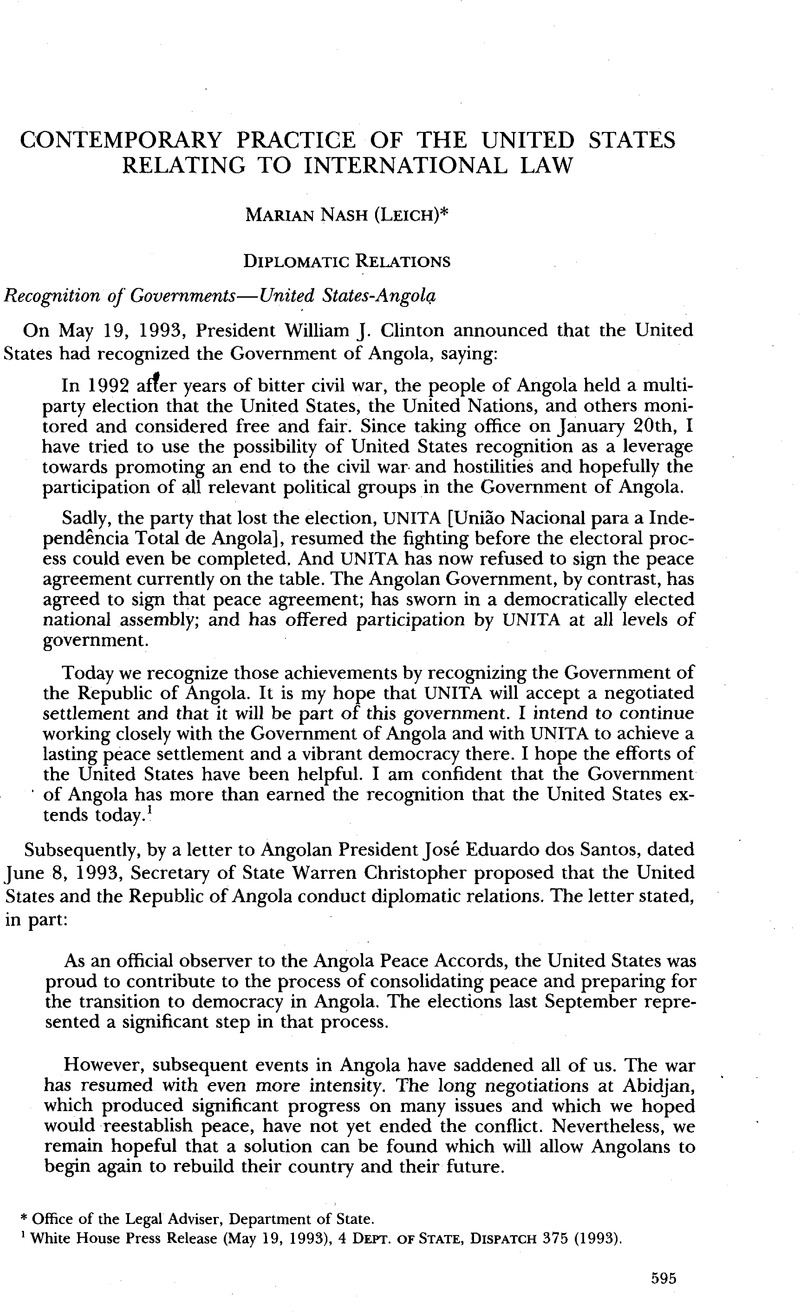Published online by Cambridge University Press: 27 February 2017

1 White House Press Release (May 19, 1993), 4 Dept. of State, Dispatch 375 (1993).
2 Dept. of State File No. P93 0074–0734/0735.
3 Id., No. P93 0074-0738. Afterwards, George Moose, Assistant Secretary of State for African Affairs, and Angolan Foreign Minister Venancio de Silva Moura jointly confirmed the establishment of diplomatic relations between their two governments by a declaration to that effect, executed at Luanda, June 21, 1993, id., No. P93 0074-0739.
4 The Accords were signed by President dos Santos of the People’s Republic of Angola (the Luanda government) and President Jonas Savimbi of UNITA, and consisted of the following documents (all attachments to UN Doc. S/22609 (1991)):
(1) the Cease-Fire Agreement, which included the formation of a Joint Verification and Monitoring Commission to monitor cease-fire implementation (Attachment I);
(2) Fundamental Principles for the Establishment of Peace, which included the formation of a Joint Political-Military Commission, with ultimate responsibility for implementation of all aspects of the Accords (Attachment II);
(3) Concepts for Resolving the Issues Still Pending Between the Government of the People’s Republic of Angola and UNITA (the “Washington Concepts Paper,” which contained fundamental concepts underlying a framework for settlement) (Attachment III);
(4) the Protocol of Estoril (Attachment IV), which included annexes on (a) free and fair multiparty elections between September and November, 1992; (b) internal security (the neutrality of the police force to be guaranteed by the presence of UN monitors); (c) the structure and mandate of the Joint Political-Military Commission; (d) administrative structures for the UNITA-held areas; (e) a definition of UNITA’s political rights once the cease-fire was signed; and (f) the formation of new, politically neutral, national armed forces.
A de facto suspension of hostilities in Angola had begun on May 15, 1991, upon notification by the parties to the Prime Minister of Portugal that they had approved the Accords.
5 2 Dept. of State, Dispatch 410 (1991). A “Fact Sheet” summarized the background to the Accords, as follows:
The Angolan civil war has raged since 1975 between the Luanda government of the Popular Movement for the Liberation of Angola (MPLA) and the National Union for Total Independence of Angola (UNITA). It ravaged the countryside, causing considerable disruption of political and economic life. Since 1979, UNITA has effectively controlled the southeastern quarter of the country. The presence of Cuban and South African forces in Angola complicated the civil war. In 1988, the United States successfully mediated negotiations leading to the departure of these foreign forces from the country, as well as the independence of Namibia. Between April 1990 and May 1991, negotiations between the Luanda government and UNITA were conducted under the mediation of Portugal. The United States and the Soviet Union were official observers at these negotiations and played a facilitative role in helping the two parties reach the agreements … signed on May 31.
Id.
1 The Provisional Government of Eritrea had been set up by the Eritrean People’s Liberation Front (EPLF) on May 29, 1991, after the EPLF had defeated forces of the former Mengistu regime and secured control of the provincial capital, Asmara, reportedly on May 24, 1991. The Ethiopian People’s Revolutionary Democratic Front (EPRDF), which entered Addis Ababa on May 28, 1991, as part of a U.S.-mediated cease-fire, had committed itself to respect the results of the referendum, also endorsed by the Transitional Government of Ethiopia (established by the EPRDF) and by the Conference on Peace and Democracy in Ethiopia, held at Addis Ababa, July 1–5, 1991. See UN Doc. A/C.3/47/5 (1992); and GA Res. 47/114 (Dec. 16, 1992).
2 4 Dept. of State, Dispatch 320 (1993).
3 Dept. of State File No. P93 0077-1876/1877.
4 Note No. BA/ED/050/93 (June 3, 1993). For the note, the reply of the American Consulate, by note No. 52 (June 9, 1993), and the reply of the Ministry of Foreign Affairs of the Government of Eritrea, by its note No. FA/AD/013/93 (June 11, 1993), see Dept. of State File No. P93 0077-1875, 1873/1874, and 1872.
1 Dept. of State File No. P93 0078-0309/0311.
2 Dept. of State, Files Bureau of Consular Affairs.
1 Dept. of State File No. P93 0071-1636/1641; for the covering note from the U.S. Mission to the United Nations (May 13, 1993), see id., No. P93 0071-1629.
For the Report of the International Meeting of Experts on the Establishment of an International Criminal Tribunal (International Centre for Criminal Law Reform and Criminal Justice Policy, Vancouver, Canada, Mar. 22-26, 1993), see id., No. P93 0071-1642/1681.
1 Note from the U.S. Mission to the United Nations addressed to the Secretary-General (Feb. 1, 1993), Dept. of State File No. P93 0074-1851.
2 Id., No. P93 0071-0961/0962.
3 Id., No. P93 0071-0963/0970.
1 Convention for the Protection and Development of the Marine Environment of the Wider Carib bean Region, with Protocol Concerning Cooperation in Combating Oil Spills in the Wider Caribbean Region, with annex, Mar. 24, 1983, TIAS No. 11,085 (entered into force Oct. 11, 1986).
2 S. Treaty Doc. No. 5, 103d Cong., 1st Sess., at III (1993).
3 Id. at V–IX.
1 Exec. Order No. 12,810, 57 Fed. Reg. 24,347 (1992); Exec. Order No. 12,831, 58 Fed. Reg. 5253 (1993).
2 58 Fed. Reg. 30,693 (1993). President Clinton’s action was taken in accordance with §202(d) of the National Emergencies Act, 50 U.S.C. §1622(d) (1988).
3 Exec. Order No. 12,808, 3 C.F.R. 305 (1992).
4 See note 1 supra. President Clinton issued Executive Order No. 12,846 on April 25, 1993, in response to Security Council Resolution 820 (Apr. 17, 1993), reprinted in 87 AJIL 521 (1993). Exec. Order No. 12,846, 58 Fed. Reg. 25,771 (1993).
5 SC Res. 757 (May 30, 1992), reprinted in 31 ILM 1453 (1992).
6 Dept. of State File No. P93 0078-0321, 0323.
7 Id., No. P93 0078-0313/0317.
8 Id., No. P93 0078-0318/0320.